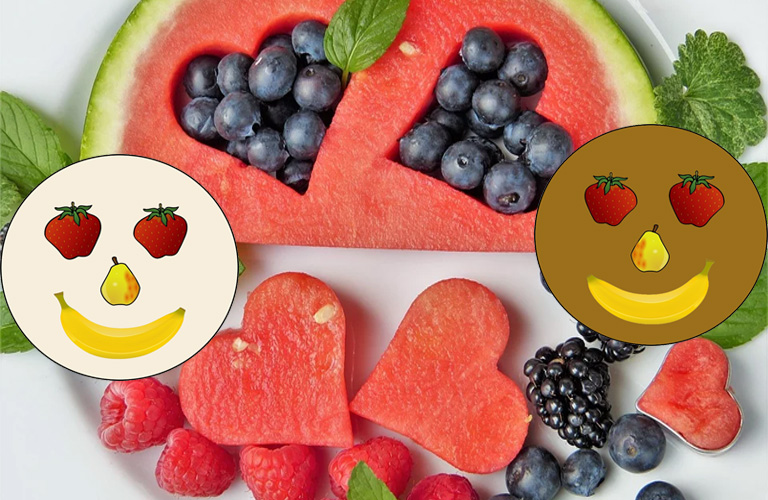Tips for parents
Get Your Kids to Eat Healthy
By Maya Gavric
Helping children develop healthy eating habits is a struggle for many parents. The vast majority of children don't eat enough fruits and vegetables. Many parents count juice as fruit, but juice consumption is much less nutritious, don't have needed fibre and excess juice consumption has been associated with obesity in some children. Fruits and vegetables contribute key vitamins and minerals, as well as fibre, to a child's diet and are vital in preventing many chronic diseases later in life.
With the hectic pace of many families' lives and with more women working full time, even health conscious parents are finding it easy to tolerate less than desirable eating habits. Heart and blood vessel disease can begin very early and hardening of the arteries (arteriosclerosis or atherosclerosis) can be associated with a high-fat, high-sugar, high-starch diets, and not enough vitamins and fibre in the diet.
Parents need to guide their children and help them to develop healthy eating habits. Great number of parents don't want to struggle with the food issues so they give up, letting kids make their own choices. As adults, we should know that children's judgment is less mature and they still depend on parents or guardians to guide them.

"It does kids no favors, and sets them up for a potential lifetime of poor health and social embarrassment, to excuse them from family meals of real food. Everyone benefits from healthy eating, but it is particularly crucial at the beginning of life." ~ Dr. Andrew Weil
NOTE: Limit screen time for your family. Many studies are showing that kids spend an average 25 to 30 hours a week in front of a TV or computer. Everyone knows what too much television or video games can do to the mind and what too little exercise can do to the body. Screen time also lead to an increase in diseases related with obesity, circulation and digestion. Experts suggest cutting down viewing time to maximum of 14 to 15 hours a week. Use the rest of the time to do some family fun with plenty of physical activities.
ABOUT THE AUTHOR
Maya Gavric, entrepreneur, consultant, former realtor, writer, web developer, artist and marketing coach has been working, researching and reporting on the Internet for years. Her numerous articles offer valuable insight and tips on wide variety of topics. In recent times she has paid particular attention to knowledge management on the Internet and environmental problems, exploring how our attention to hot issues might best transform current situation into better practice.
The article "Get Your Kids to Eat Healthy" reprinted with permission.
Tips for parents to get their kids to eat healthy:
- Getting your kids to eat healthy food can be difficult. Serve healthy food choices with same enthusiasm as dessert.
- Try to serve vegetables more often and present them in a simple way. If you are serving cooked vegetables, don't overcook them.
- Ask your kids to help you with the shopping and meal preparation. Try to make food shopping and preparation interesting and fun activity for the whole family. Kids like to help and have fun. Activity like that is also a good way to get them more interested in what you're serving.
- Avoid convenience foods that are loaded with fats, carbohydrates, and sugar. Always read nutrition labels before you buy any new product and don't believe the hype until you've read the fine print on the nutritional label.
- Get your kids to drink more water and take a stand against carbonated drinks and fruit juices. They are among the biggest culprits behind childhood obesity and full of empty calories.
- Start training your children about healthy eating habits as soon as they can talk since they are most influenced by their families during the preschool years. Keep in mind that bad eating habits developed while young can become toxic later in life.
- Because the childhood impulse to imitate is strong, role modeling is a powerful tool. Always try to avoid unhealthy diet in your household. The best move you can make to start your child off on the right dietary foot is to fill your plate with healthy food selections. Be a powerful role model, so that when your child asks to taste what you're eating, your plate is always filled with healthy food selections.
- Make sure your unhealthy food choices will not override your good intentions. Avoid eating unhealthy food when your children are around and avoid having unhealthy food in the house. It's a lot easier to keep junk food out of the house than saying no to your children.
- Encourage your child to taste a new food, but don't get into a confrontation. Be patient, young children have a natural dislike for new foods. After many repeated exposures, they will likely try them.
- Always control portion sizes. Remember, kids don't need adult size portions. Never overfeed your children, because if you do, they will consistently seek out more than their body needs.
- Never offer any reward for eating food. It is not a parent's job to force or act silly in order to get their child to eat. In fact, research suggests using these tactics may only make a child more resistant. Always respect true food dislikes.
- Create a positive mealtime environment. Eat with your child and focus on good conversation rather than what he/she is eating. A parent's job is to plan well balanced meals and snacks and create a positive mealtime environment.
- Avoid fast-food restaurants because they are well known fat factories. Some family restaurants and table service establishments with their big portions and food loaded with trans fats can be just as bad. Look for healthy food restaurant or buffet-style restaurants where you can decide on portion size and food choice.
- Fat is important building block for a children's growth and essential for your child's mental and physical development, so be careful not to eliminate all the fat from child's diet. Instead, replace bad fats with healthy monounsaturated fats from foods like olives, nuts, avocados, etc.
- Kids and adults eat more when TV is on during meals or when they eat in front of the computer screen. Studies are showing that this behavior is one of the biggest causes of overeating, because viewers are too distracted to notice when they're full. Distraction overrides our ability to know when to stop eating.
CHEWING FOOD THOROUGHLY IS MORE IMPORTANT THAN YOU THINK. IT HELPS SALIVA TO BEGIN THE PROCESS OF DIGESTION, EASES THE BURDEN ON YOUR STOMACH, AND WILL HELP YOU IDENTIFY WHEN YOU ARE FULL.
Did You Know?
Plant based diets have been linked with major benefits, like increased antioxidant intake, reduced risk of heart disease, certain cancers, obesity, diabetes and cognitive decline.A growing body of scientific evidence shows that energy drinks can have serious health effects, particularly in children, teenagers, and young adults. Energy drinks are widely promoted as products that increase energy and enhance mental alertness and physical performance. Next to multivitamins, energy drinks are the most popular dietary supplement consumed by American teens and young adults. Read more about current health concerns...





